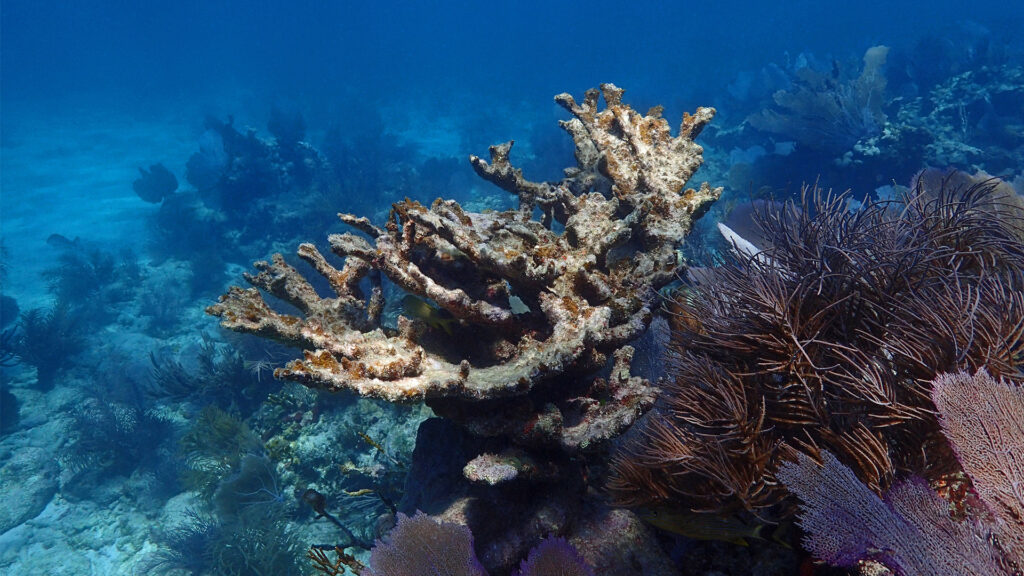By Diana Udel, University of Miami News
A new study published in the journal Coral Reefs reveals that heat-tolerant symbiotic algae may be essential to saving elkhorn coral (Acropora palmata) — a foundational species in Caribbean reef ecosystems — from the devastating impacts of marine heatwaves and coral bleaching.
The research, conducted by scientists at the University of Miami Rosenstiel School of Marine, Atmospheric, and Earth Science, in collaboration with scientists from The Shedd Aquarium, Coral Restoration Foundation, Reef Renewal, and Mote Marine Laboratory, provides timely insights into the thermal tolerance of elkhorn coral, a focal species for coral restoration efforts in Florida and currently listed under the Endangered Species Act.
The study, conducted in June 2022, one year before the unprecedented 2023 marine heatwave, tested 172 elkhorn coral colonies sourced from restoration nurseries stretching from Miami to the lower Florida Keys. Using custom-built rapid heat stress testing systems onboard the Shedd Aquarium’s research vessel, R/V Coral Reef II, researchers tested coral fragments under a range of temperature treatments to assess their heat tolerance.

Their findings showed that elkhorn corals hosting the heat-tolerant symbiont Durusdinium could survive short-term exposure to temperatures almost 2 degrees C higher than those with the more common Symbiodinium. These resilient colonies were sexually derived juvenile corals that had acquired Durusdinium in Mote Marine Laboratory’s land-based facility on Summerland Key, providing evidence that manipulating symbiont communities in early life stages can be a very effective strategy for producing heat-tolerant corals for restoration.
“This study represents the most extensive thermal tolerance dataset gathered on A. palmata, revealing that, in Florida, the type of symbiotic algae a coral host, has a greater ability to increase heat resistance than environmental factors or genetic differences among different coral individuals,” said Richard Karp, the lead author of the study, who conducted the research while a doctoral student at the Rosenstiel School. “By incorporating novel interventions like heat-tolerant symbionts into restoration efforts, we can boost coral resilience and help restore this iconic species.”
The findings come at a critical time, as a global coral bleaching event — officially declared in 2024 — has already impacted 84% of the world’s reefs. The 2023 marine heatwave wiped out many remaining wild elkhorn colonies along Florida’s Coral Reef, underscoring the need for climate-resilient coral restoration strategies.
This study emphasizes the importance of scaling up symbiont-based interventions as part of current and future coral conservation and restoration work. By shifting coral-algal partnerships toward more thermally resilient symbionts, restoration practitioners may enhance the survival and long-term stability of coral populations in the face of increasing ocean temperatures.
“This is an example of Florida’s reef scientists sharing their scientific and restoration expertise and their coral nurseries, ships, and laboratories to make critical discoveries,” said Andrew Baker, a professor of marine biology and ecology at the Rosenstiel School and Karp’s doctoral advisor. “We need to continue to innovate and think outside the box to keep developing new approaches to help coral reefs in their fight for survival against continued warming and coral bleaching”.
Funding for the study was provided by National Oceanic and Atmospheric Administration-Coral Reef Conservation Program: NA20NMF4820289 and the Defense Advanced Research Projects Agency-Biological Technologies Office (DARPA): HR00112220041.
The study titled: “Heat-tolerant algal symbionts may prevent extirpation of the threatened elkhorn coral, Acropora palmata, in Florida during intensifying marine heatwaves,” was published April 22 in the journal Coral Reefs.
The authors include Richard F. Karp; Fabrizio Lepiz-Conejo, University of Miami Rosenstiel School of Marine, Atmospheric, and Earth Science; Shayle B. Matsuda and Bryce Corbett, Shedd Aquarium; Alexandra D. Wen, Joseph D. Unsworth, and Martine D’Alessandro, Rosenstiel School; Ken Nedimyer, Reef Renewal, USA; Amelia Moura, Coral Restoration Foundation; Erinn M. Muller and Zachary Craig, Mote Marine Laboratory; Diego Lirman, Rosenstiel School; Ross Cunning, Shedd Aquarium; and Andrew Baker, Rosenstiel School.
This piece was originally published at https://news.miami.edu/rosenstiel/stories/2025/05/heat-tolerant-symbionts-a-critical-key-to-protecting-floridas-elkhorn-coral-from-bleaching-during-marine-heatwaves.html. Banner photo: Scientists Rich Karp (left) and Fabrizio Lepiz-Conejo, examine elkhorn coral fragments from one of the coral restoration nursery sites used in the study. (Image: Hilary Wind, Shedd Aquarium).
Sign up for The Invading Sea newsletter by visiting here. To support The Invading Sea, click here to make a donation. If you are interested in submitting an opinion piece to The Invading Sea, email Editor Nathan Crabbe at nc*****@*au.edu. To learn more about coral bleaching, watch the video below.



